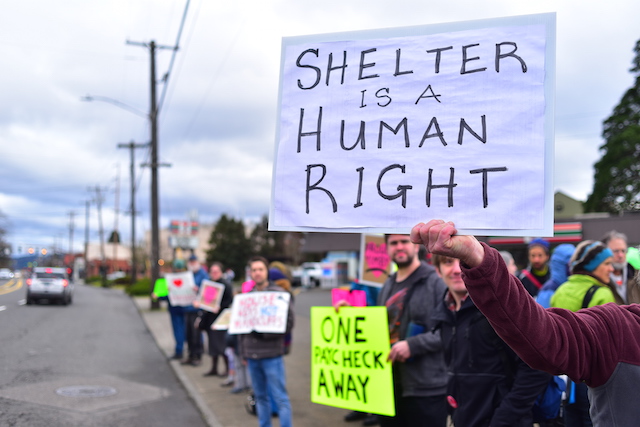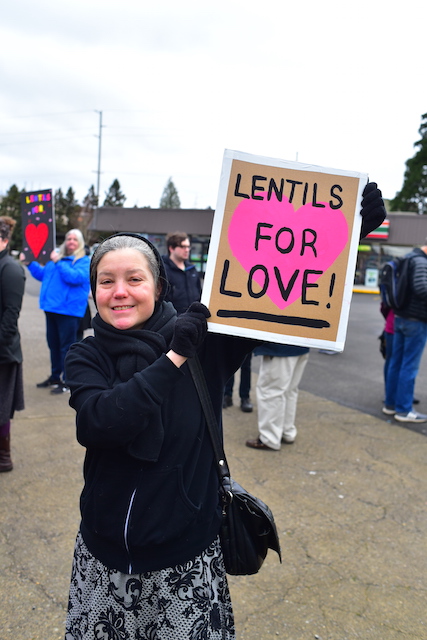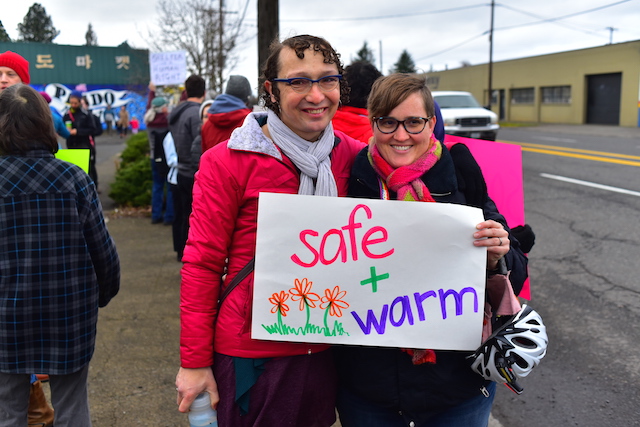
Story and photos by Pete Shaw
Another day, another fight over a proposed shelter for people without housing. Saturday January 20 saw nearly 75 people gathered near the corner of Southeast Foster and 61st outside the empty storefront that the City has proposed as a haven for about 100 people without housing. Nearly all of them supported the shelter. Those advocates were originally gathering as a counter-protest to a rally in opposition to it called by a group calling itself the Lents Neighborhood Livability Association (LNLA). The LNLA’s rally was called off at the last moment, although two or three people who perhaps did not get the message showed up to express their hostility toward the needed place of refuge.
It is no secret that the City of Portland, along with much of the rest of the country, is struggling with a housing crisis. And while it seems that for the most part City leadership is doing all it can to avoid the obvious solution to the problem–putting people without housing into housing–its piecemeal plans, such as those resulting in a new location for Right 2 Dream Too (R2DToo) near the Rose Garden Arena and the establishment of Hazelnut Grove on North Greeley near the confluence of Interstates 5 and 405, at least help provide some modicum of security for people who would otherwise be out on the streets, possibly to die.
But even those mild attempts at amelioration run into trouble, usually from people who, while beating their breasts as they profess how much they care for people without housing, demand that shelters for those people be located anywhere but near them. A few years ago, when R2DToo was readying to move from its spot on Burnside and 4th to a place under the northwest ramp of the Broadway Bridge, Pearl District residents flooded City Council and scuttled the deal, many of them expressing a hatred toward people without housing that defied even the most minimal standards of decency and humanity. The reaction toward the residents of Hazelnut Grove has at times been the same.
During a public meeting at which the project was discussed held a week before Christmas at the Service Employees International Union Local 503 Hall, some residents of the area gave Mayor Ted Wheeler and Multnomah County Chair Deborah Kafoury more of the familiar grief and anti-houseless people propaganda. The usual excuses were given–theft, needles, the children, nearby school students, piss on the sidewalks, effects on business–along with the requisite caveat that these justifications for making sure people are left out on the streets are ultimately about something other than a general disdain for people without housing.
 It is probably unfair to state that all these people opposed to the shelter hate people without housing or regard them as sub-human. One of the points of contention, that Southeast Portland is traditionally the place where the City unloads its difficulties, does hold water, and it is completely reasonable for residents to demand that providing shelter and services to people without housing–that is, caring about our most vulnerable neighbors–is an affair that should be spread throughout the city.
It is probably unfair to state that all these people opposed to the shelter hate people without housing or regard them as sub-human. One of the points of contention, that Southeast Portland is traditionally the place where the City unloads its difficulties, does hold water, and it is completely reasonable for residents to demand that providing shelter and services to people without housing–that is, caring about our most vulnerable neighbors–is an affair that should be spread throughout the city.
But the fact remains that once again when it came time for people to step up and actually provide some measure of humanity toward people without housing in their own neighborhood, it didn’t happen. The problem of houselessness, it seems for many, is best left as an abstraction, perhaps dealt with for an hour or so on a Saturday or Sunday morning in a house of worship.
“There is a housing problem,” said Andreina Velasco, whose family lives near the proposed shelter. “I know that shelters aren’t a long term solution, but they are a way to at least address the problem in a short-term way, especially for people who are needing a shelter right away.”
Velasco acknowledged that some opponents’ gripes held some legitimacy. For instance, she noted that the owner of the proposed shelter’s neighboring 7-11 was rightly upset that he had almost no participation in the process. But she added that while that process of choosing the spot for the shelter could have been improved, it was one among many complaints that ultimately were distracting from the larger reality of people needing shelter.
“It’s that same situation of, well, where are we gonna find a place?” said Velasco. “Aren’t we all neighbors already? And then a lot of people are talking about the alternative high school behind the site and the YMCA daycare next door, so again, it goes back to the issue of fear. So there’s this fear that if you have homeless people around, then something is going to happen to children. I think I saw one post that was really smart saying there are a lot of homeless youth. So why don’t you just ask some of the kids at the alternative high school? Some people did and they were like, ‘Why wouldn’t we want a shelter there?’ I think it’s a lot of not having the conversations and just assuming.”
“I’m just sick of people saying, ‘It’s a great idea, just not here,’ Velasco continued. “I know there’s going to be issues, but hopefully there are processes set up that are going to address those issues. But it’s got to be somewhere, now. Otherwise the ball just get moved around, and people who are just full of fear will keep winning the debate.”
Fear, as the English mathematician, philosopher, and statesman Bertrand Russell once noted, breeds cruelty, and it seems entirely proper to label some of the people opposed to the shelter as hateful and cruel. How else does one describe the members of the Lents Neighborhood Livability Association (LNLA)–not to be confused with the Lents Neighborhood Association–who saw fit on Christmas Eve to send out a group email with vile lyrics substituted for the official words of “The Twelve Days of Christmas”? Following the original song’s structure of each stanza adding one gift to the gifts from the prior stanzas, the final verse read:
On the twelfth day of Christmas
My City sent to me
Twelve tweakers tweaking
Eleven crack pipe smokers
Ten junkies nodding
Nine ladies hooking
Eight mental defects
Seven beggars begging
Six stolen bikes
Five quarts of trail tea
Four piles of feces
Three midnight gunshots
Two hundred dirty needles
A homeless shelter down the street from me!
This foul rendition was made public by activist and former mayoral candidate Sarah Innarone, who published it on her Twitter feed.
It was Innarone who called for the protest against the LNLA’s later-aborted rally. With only a handful of people there who opposed the shelter–and really, who would want to be caught in public supporting a group like the LNLA, who thought it was a good idea to publish those lyrics for all the world to see?–it was a muted affair.
As noted above, the vitriolic stereotypes of people without housing were nothing new. When Right 2 Dream Too was readying for that move to under the Broadway Bridge, quite a few people expressed similar sentiments. However, Right 2 Dream Too has proven an excellent model for providing services to people without housing and by all accounts, when the rest area was located downtown, its members were good neighbors who not surprisingly acted like decent human beings. Unlike the members of the LNLA.
 But outside of the debate surrounding the shelter on Foster and 61st, a larger question loomed. Why was the space not opened immediately? It is Winter. It is cold. It is wet. It is not safe to be exposed to be these elements, and it is certainly far from comfortable. The City could easily open the doors and turn on the heat, and supporters could, with little effort, round up sleeping bags and pads to put them on. It is the least that could be done, and it was a glaring example of a government and society–one that proudly declares itself liberal, even progressive–that values property over people’s lives.
But outside of the debate surrounding the shelter on Foster and 61st, a larger question loomed. Why was the space not opened immediately? It is Winter. It is cold. It is wet. It is not safe to be exposed to be these elements, and it is certainly far from comfortable. The City could easily open the doors and turn on the heat, and supporters could, with little effort, round up sleeping bags and pads to put them on. It is the least that could be done, and it was a glaring example of a government and society–one that proudly declares itself liberal, even progressive–that values property over people’s lives.
The debate over the shelter also comes within the context of a Republican Trump Administration which has fanned the flames of fearing and hating others. “I’m an immigrant,” said Velasco, “and right now there’s all this hate against immigrants. It’s the same thing against houseless people. Just to connect those dots and build those bridges–I think it’s really important breaking down that fear and going back to empathy, because that’s what hate really destroys.”
Velasco also stated that many people’s fears seemed unfounded, noting that the agency that will be running the shelter, Transitions Projects, “has a really great track record of offering wrap-around services,” which too has been an issue of contention. Those services include finding safe places for people to sleep, placing people in affordable housing, and helping them retain that housing.
Ultimately, if the problem of houselessness is to be solved, shelters like the one that will open on Foster and 61st need to be seen both as opportunities and temporary half-fixes.
“Of course, the immediate issue of housing and shelter is not going to be solved,” said Velasco as the crowd started chanting, ‘We’re all neighbors, with houses or without them!’ “But the long term issues of humanity and building relationships and overcoming trauma–some of those things can be addressed if you put people in contact with services and with each other. That’s why we’re really interested once things are up and running, making sure to volunteer here and getting to know our new neighbors.”






